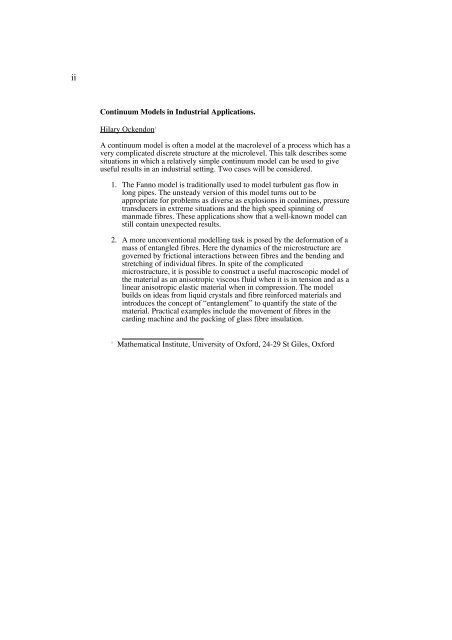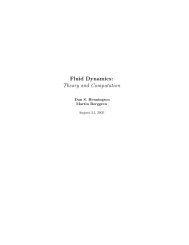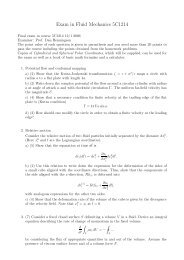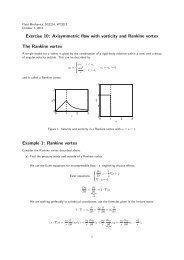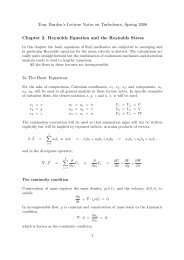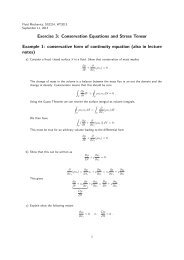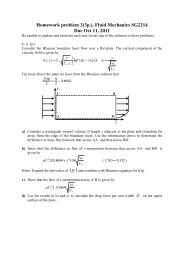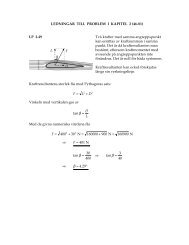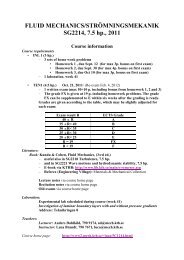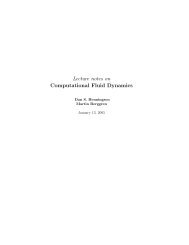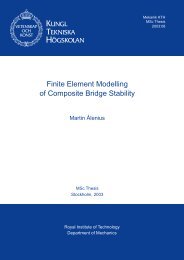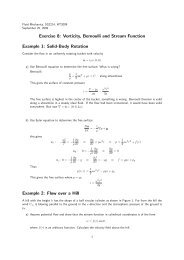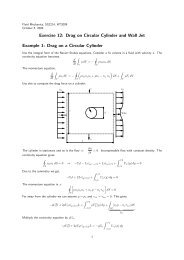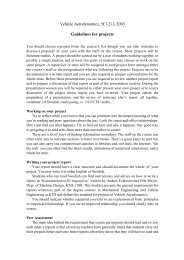- Page 1: EFMC6 KTH Electronic version Abstra
- Page 5: Euromech Fluid Mechanics Lecturer H
- Page 10 and 11: iv Slip Behavior at Liquid/Solid In
- Page 12 and 13: vi ¡ £ ¥ § © £ § £
- Page 14 and 15: viii Premixed Turbulent combustion
- Page 17: Session 1
- Page 20 and 21: 2 Global stability of jets and sens
- Page 22 and 23: 4 Control of instabilities in a cav
- Page 24 and 25: 6 The dispersal, decay and instabil
- Page 26 and 27: 8 Steady and pulsatile flow through
- Page 28: 10 Pulsatile flows in pipes with fi
- Page 31 and 32: Global stability of the rotating di
- Page 33 and 34: Continuous Spectrum Growth and Moda
- Page 35 and 36: The influence of centrifugal buoyan
- Page 37 and 38: Prediction of wall bounded flows us
- Page 39 and 40: Uncertainty Quantification in Large
- Page 41 and 42: Stratified turbulence G. Brethouwer
- Page 43 and 44: Investigations of turbulence statis
- Page 45 and 46: Coupling weather-scale flow with st
- Page 47 and 48: Flow Separation from a Free Surface
- Page 49 and 50: Phase-Field Simulations of Free Bou
- Page 51 and 52: Evaluation of a universal transitio
- Page 53 and 54: Computations of turbulent boundary
- Page 55 and 56: Flow Developments in Smooth Wall Ci
- Page 57 and 58: Super-late stages of boundary-layer
- Page 59 and 60:
Low-speed streaks developing at the
- Page 61:
Direct Numerical Simulation of Lami
- Page 64 and 65:
44 Axisymmetric absolute instabilit
- Page 66:
46
- Page 69 and 70:
Application of the ray-tracing theo
- Page 71 and 72:
Leaky Waves in Supersonic Boundary
- Page 73 and 74:
Solving turbulent wall flow in 2D u
- Page 75 and 76:
55 Development of a 3D transient in
- Page 78 and 79:
58 Upper bounds for the long-time a
- Page 80 and 81:
60 Numerical Simulations of Rigid F
- Page 82 and 83:
62 On the translational and rotatio
- Page 84 and 85:
64 A Shell-Model Study of Turbulent
- Page 86 and 87:
66 Using CSP for Modeling Burgers-T
- Page 88 and 89:
68 High Spatially Resolved Velocity
- Page 91:
Dynamic Lift of Airfoils R. Grüneb
- Page 94 and 95:
72 Experimental study on the bounda
- Page 96 and 97:
74 Natural sinuous and varicose bre
- Page 99 and 100:
Numerical simulation of the three-d
- Page 101 and 102:
Effects of the flexibility of the a
- Page 103 and 104:
Wave forerunners of longitudinal st
- Page 105 and 106:
Stability and sensitivity analysis
- Page 107 and 108:
Stability of reacting gas jets Jose
- Page 109 and 110:
Elastocapillarity in wet hairs J. B
- Page 111 and 112:
Open Capillary Channel Flows (CCF):
- Page 113:
Stick-slip motion of droplets of co
- Page 116 and 117:
94 A general theory for stratified
- Page 118 and 119:
96 £ ¥ § © £ ¥ ©
- Page 120 and 121:
98 The influence of the density max
- Page 122 and 123:
100 TRANSIENT DISPLACEMENT OF A NEW
- Page 124 and 125:
102 Experimental study of the effec
- Page 126 and 127:
104 Nu Numerical modeling of heat t
- Page 128 and 129:
106 Turbulent thermal convection ov
- Page 130 and 131:
108
- Page 132 and 133:
110 Modelling of optimal vortex rin
- Page 134 and 135:
112 The effect of a sphere on a swi
- Page 136 and 137:
114 Three-dimensional stability of
- Page 139 and 140:
Session 4
- Page 141 and 142:
117
- Page 143 and 144:
Nonlinear long waves on an interfac
- Page 145 and 146:
Three-dimensional gravity-capillary
- Page 147 and 148:
Linear and non-linear theory of lon
- Page 149 and 150:
Surface oscillations of liquid nitr
- Page 151 and 152:
Waves above turbulence R. Savelsber
- Page 153 and 154:
Figure 1 : Vorticity contours and s
- Page 155 and 156:
Investigation of flow structure upo
- Page 157 and 158:
Simultaneous density and concentrat
- Page 159:
Introduction of newly developed tow
- Page 162 and 163:
136 A Simple Model for Gas-Grain Tw
- Page 164 and 165:
138 Dynamics of heavy particles nea
- Page 166 and 167:
140 Stability of dusty gas flow in
- Page 168 and 169:
142 Joint fluid-particle pdf modeli
- Page 170 and 171:
144 Three-dimensional stability of
- Page 172 and 173:
146 Mixing by merging Kelvin-Helmho
- Page 174 and 175:
148
- Page 176 and 177:
150 a Institute of Thermophysics, 6
- Page 178 and 179:
152 Direct numerical simulations of
- Page 180 and 181:
154 Study of anisotropy in purely s
- Page 182 and 183:
156 Direct numerical simulation of
- Page 184 and 185:
Assessment of a wavelet based coher
- Page 186 and 187:
Numerical study of turbulence in a
- Page 188 and 189:
162
- Page 190 and 191:
164 Flowcontrol with crosswise grov
- Page 192 and 193:
166 Experiments on the reverse Bén
- Page 194 and 195:
168 Kinematic-dynamic correspondenc
- Page 196 and 197:
170 Three-dimensional structures in
- Page 198 and 199:
172 Lagrangian (physical) analysis
- Page 201 and 202:
The evolution of energy in flow dri
- Page 203 and 204:
175
- Page 205 and 206:
Mechanisms of gas migration through
- Page 207 and 208:
Surface waves in coupled channels a
- Page 209 and 210:
Validation of urban dispersion simu
- Page 211 and 212:
Numerical study of flow patterns in
- Page 213 and 214:
Generation of metal nanodroplets an
- Page 215 and 216:
Oscillations of Thin Liquid Shells
- Page 217 and 218:
3D chaotic mixing inside drops driv
- Page 219 and 220:
The interaction between negatively
- Page 221 and 222:
Coherent Large-Scale Structures and
- Page 223 and 224:
Turbulent mixing in the entry regio
- Page 225 and 226:
|P|max 0.16 0.14 0.12 0.1 0.08 0.06
- Page 227 and 228:
Experiments on vortex pair dynamics
- Page 229:
List of authors Ordinary lectures a
- Page 232 and 233:
LIST OF AUTHORS Borel H. 340 Castro
- Page 234 and 235:
LIST OF AUTHORS Glezer A. 259 Haspa
- Page 236 and 237:
LIST OF AUTHORS Lebon L. 238, 266 M
- Page 238 and 239:
LIST OF AUTHORS Poplavskaya T. V. 4
- Page 240:
LIST OF AUTHORS Tuzi R. 11 Wolters


